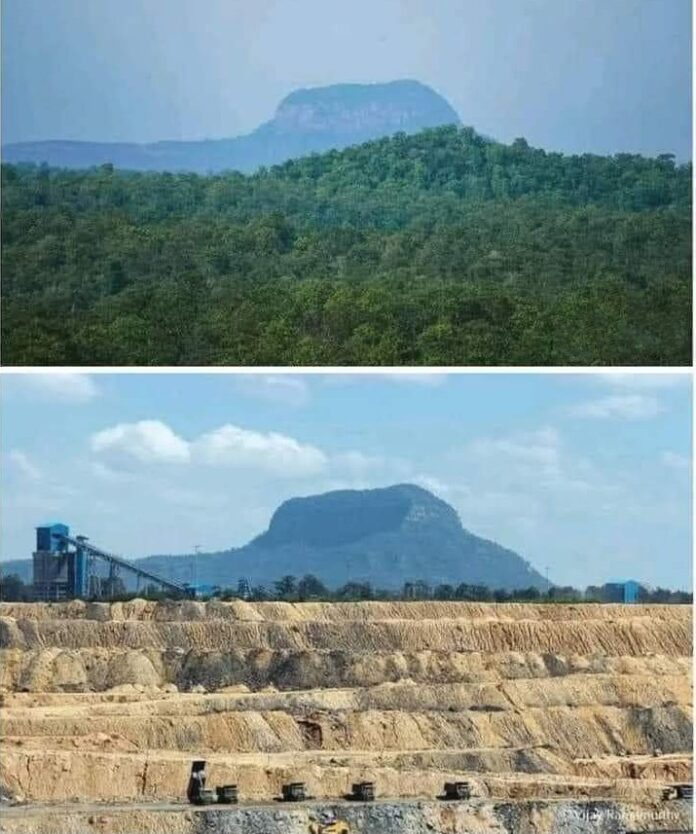Deforestation is one of the major costs associated with achieving continual development. While the pursuit of economic growth and structural expansion has sense, the unchecked devastation of forests that goes hand in hand with these endeavors is an egregious offense against the natural world

Niraj Krishna
Our life would be unimaginable without the environment. Every facet of nature is essential to keeping life on Earth going. The ecological equilibrium that nature preserves is crucial for sustainable development. But we have upset this natural equilibrium in a number of ways. This was caused in the past by ignorance and illiteracy, but as humanity advanced, people started to abuse and contaminate natural resources. For us, soil, air, and water contamination have grown to be serious issues.
Novel obstacles are arising from several origins, which may be man-made or natural. We are faced with natural hazards such as unpredictable floods, earthquakes, tsunamis, landslides, and droughts. Most contemporary problems are man-made. These are the outcome of scientific and technical advancements, our way of life, and disregard for the environment. These days, we pollute the environment, generate different kinds of garbage, contribute to global warming, and more.
Deforestation is one of the major costs associated with achieving continual development. While the pursuit of economic growth and structural expansion has sense, the unchecked devastation of forests that goes hand in hand with these endeavors is an egregious offense against the natural world, humankind, and the next generation. The lungs of our world, forests are vital to biodiversity, ecological balance, and climate regulation. Eliminating them for immediate benefit compromises stability in the long run and the basis of life as we know it.
Roughly 31% of the surface on Earth is made up by forests, which are also home to 80% of all terrestrial animal, plant, and insect species. They are essential to preserving biodiversity and the ecological equilibrium. The lungs of our planet, forests are essential to keeping life on Earth going. However, despite their great significance, human activity continues to pose a threat to forests. There has never been a greater pressing need to switch from deforestation to forest cultivation.
Let’s start by discussing the adversaries of the environment. The earth, water, fire, sky, and air are the five components that make up the environment. Our existence depends on air. Because oxygen is delivered by ventilators under critical situations, the oxygen gas in the air is also referred to as the breath of life. During the COVID-19 epidemic, we saw firsthand the significance of oxygen and the resulting chaos when it became scarce. There were claims of deaths brought on by a shortage of oxygen. Regardless, the only naturally occurring sources of atmospheric oxygen are trees. Carbon dioxide, which is released by humans, is toxic.
These trees, like the Great God Lord Shiva, take up our poisonous emissions. Green leaves, in particular, contain chlorophyll, which when combined with nitrogen and carbon dioxide in the presence of sunshine, produces food, fruits, vegetables, fuel, and a variety of other life-sustaining medications.
The preservation of the Earth’s natural equilibrium is largely dependent on forests. By removing a significant quantity of carbon dioxide from the atmosphere, they function as carbon sinks and lessen the effects of climate change. Global temperatures rise when forests are destroyed because this stored carbon is released back into the atmosphere. Deforestation is a major contributor to climate change, accounting for 15% of worldwide greenhouse gas emissions, according to the World Wildlife Fund.
Furthermore, roughly 80% of the terrestrial species on Earth lives in forests. Many of the numerous plant and animal species that are lost due to forest degradation have not yet been identified and researched. The disruption of ecosystems, food chains, and natural processes—which people rely on for vital functions like pollination and water purification—caused by this loss of biodiversity has far-reaching effects.
Deforestation has a profound effect on human society in addition to the environment. Native American tribes and the surrounding populace, whose livelihoods, cultures, and customs depend on trees, are frequently uprooted. Their rights and way of life are violated in the name of progress, which results in social injustice and poverty. When these communities are uprooted, their priceless expertise of environmentally friendly living and forest preservation is gone.
Deforestation can also have detrimental effects on the economy. Even though land clearance and logging may have instant financial advantages, these advantages are frequently fleeting. The short-term benefits of deforestation are greatly outweighed by the long-term disadvantages, which include soil erosion, decreased agricultural production, and greater susceptibility to landslides and floods. Governments and the local populace are frequently left with the financial responsibility of mitigating these effects, which strains resources and impedes sustainable development.
Development-related deforestation creates serious ethical and legal challenges. The significance of forest protection is highlighted by international accords such as the Convention on Biological Diversity and the Paris Agreement. National regulations protecting forest regions are in place in many nations, but they are frequently poorly enforced, and illicit logging is nevertheless very common. This disregard for the rights of future generations and the inherent worth of nature is reflected in a larger moral failure to support legislative protective measures.
The widespread devastation of forests is morally wrong because it breaches our duties as stewards of the environment. It’s a careless strategy that puts immediate financial gain ahead of the planet’s and its people’s health and wellbeing. The choices we make now will affect future generations, and ongoing destruction in the name of development imperils their right to a sustainable and healthy environment.
Sustainable development strikes a balance between environmental preservation and economic growth, providing a workable solution. Reforestation, afforestation, and sustainable forestry techniques are necessary components of this method. Green technology that reduce their negative effects on the environment, energy efficiency, and renewable resources must be given top priority by organizations, individuals, and governments.
Trees and the entire plant world are essential to the existence of all living things. We also need to realize that the kingdom of plants is living, not dead. Like people and other creatures, they too require wide sky, energy, water, soil, and air. They are born, need to be raised, develop, are impacted by heat, cold, and precipitation, and eventually die. The only distinction is that, while they exist, they provide us food, drink, shade, and air, and we still destroy them. According to our holy writings, it is sinful to injure any plant.
It is a tremendous virtue to plant trees, and a terrible evil to destroy them. Even walking on green vegetation is forbidden in Jainism. The loss of trees creates imbalance and has an impact on all living things. Global warming is a result of human activity destroying trees. Our misdeeds are repaid in the harsh and dreadful shapes of the seasons. Hinduism values several trees, including peepal, banyan, tulsi, khejri, and others, because it recognizes their significance. We still harm trees and act selfishly in spite of this understanding.
There is flagrant negligence on the part of municipal, state, and federal governments as well as panchayat organizations. Additionally, the broader population is unaware. Religious gurus, government officials, and leaders all frequently stress the value of trees. Millions of trees are planted on paper through ongoing campaigns and rituals for tree planting. Trees are frequently not planted at all, and those that are usually die from neglect. In addition, the building of roads, bridges, railroads, and dams results in the destruction of millions of trees. Strangely, every animal and human wants shade during the summer months. People even seek cover for their cars during this time, only to ruin it themselves.
Forests being cut down for development is a terrible crime with far-reaching effects. It throws socioeconomic stability into disarray, upsets ecological equilibrium, and creates significant ethical and legal challenges. It is not just a choice; adopting sustainable development is a duty that will protect the health and welfare of our planet and future generations. Given that forests are vital to life as we know it, it is our duty as stewards of the planet to preserve and care for them.
Moreover, it is vital to fortify legislative frameworks and guarantee their stringent implementation. This entails backing global accords and domestic legislation designed to preserve forests and stop illicit logging. It’s also critical to empower indigenous people and local communities by respecting their rights and utilizing their expertise to inform conservation efforts.
Forests are priceless resources that should be protected rather than destroyed. For the sake of the future generations and the health of our planet, we must make the shift from exploitation to sustainable management. We can make sure that forests survive and continue to be the basis of life on Earth by implementing resource conservation, sustainable management, and forest restoration strategies, as well as involving local people in these initiatives. For the sake of our planet and all its people, the moment to act is now.
By creating instruments to assess pollution, science has aided in its monitoring, but more has to be done. Molecular biology and nanotechnology have more things to offer the environmental area. Determining the environmental cost of every new project, policy, or product prior to adoption is another crucial step. Doing an environmental cost-benefit analysis ought to be required for everybody. Every commodity and service has an environmental impact that has to be evaluated.
Niraj Krishna


